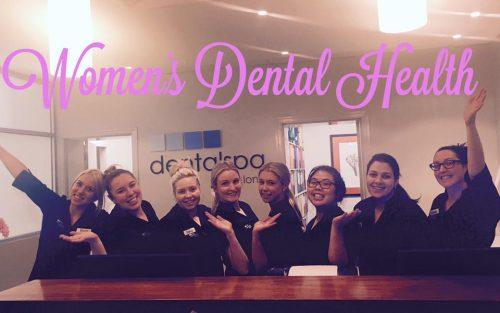The focus of this year’s annual dental health week is on Women’s dental health needs throughout key life stages. We want women maintain good oral health throughout every aspect of their lives. Hormones can play a major role on a women’s teeth and gums and many people are unaware of such changes. Throughout dental health week we are asking women to educate themselves on how teeth, gums and mouth are affected during life changes. These life changes include Puberty, Pregnancy, Menstruation and Menopause. By being aware together with the dental team, women can take a proactive and preventive approach toward their oral health.
Puberty
There are many changes occurring in the body at this time so it’s easy for the mouth to be overlooked. Increased production of hormones such as estrogen and progesterone leads to an increase of blood flow. The increased blood can can therefore make your gums more sensitive to plaque and food particles. This redness and swelling of the gums is known as puberty gingivitis. If adequate oral hygiene of brushing twice daily and flossing daily are achieved such condition can be avoided. Teenagers should take the extra steps to protect their teeth and gums, particularly for those undergoing orthodontic treatment where plaque accumulation occurs a lot more easily.
Menstruation
During the time of a women’s period or a few days prior some women can experience soreness and increased inflammation of their gums. Again this can be attributed to an increase of hormones and blood flow as a result. Temporary gingivitis may occur as will small sores/ulcers along your cheeks and tongue. By the time a women’s period arrives these concerns generally subside. Some ladies can also experience no changes at all. It is important to monitor your oral health and manage your needs accordingly. If you do experience any oral changes relating to your period it might be a good idea to manage your dental appointments around these times.
Pregnancy
As you consult with many health professionals during pregnancy, address dental needs as well. During pregnancy you may notice gum changes around the 2 month mark causing them to bleed easily when you brush and floss. Some women can be deterred from adequate brushing as a result however it is important to keep up good oral hygiene practices. Nausea and vomiting during morning sickness can also have an erosive effect on your teeth. We encourage you to wait an hour afterward before brushing to prevent damage to your enamel. Reduction in saliva flow can cause a problem as saliva helps to reduce plaque and bacterial growth which can increase your chances of dental caries.
Menopause
Most women go through menopause between the ages 47-55. As hormone levels decline during menopause the effects on your oral heath can be significant. Gums are generally affected with bleeding occurring quite easily and a condition known as menopausal gingivostomatitis may develop. Hormonal fluctuations may result in Burning mouth syndrome (BMS) which can cause strange sensations on your tongue, cheeks, lips or front of the mouth. The condition may also cause tooth sensitivity to hot and cold and some changes in taste. Dry mouth and reduced saliva function can increase plaque and bacterial growth and therefore increase chances of dental decay. Osteoporosis may also affect your jaw and cause recession and tooth loss. Changes in medications can be discussed at your dental appointments as some medications may have implications on dental treatment.
As women go through many changes throughout their lifetime it is important to maintain routine dental care. At Dentalspa we encourage routine check-ups and hygiene appointments in order to monitor and manage our patients, as it is essential through every stage of life.

By Ashleigh Lilly
Return to blog

